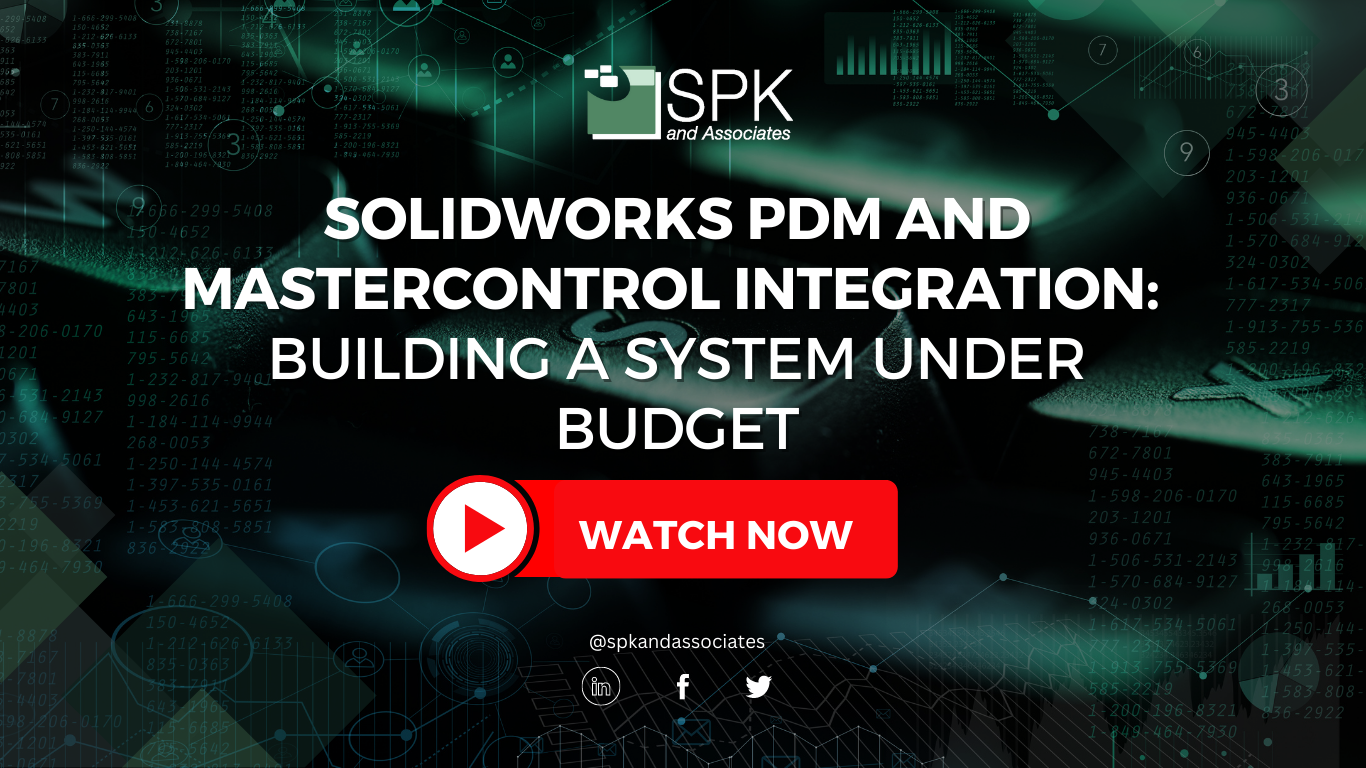Wondering if you can deliver a SolidWorks PDM and MasterControl integration? Our experts did it. Discover how, and the benefits, in this video with Michael Roberts, Vice President at SPK and Associates, and Ed Chung, Director of Engineering.
SolidWorks PDM and MasterControl Integration
The Need To Integrate
Michael: Today, we wanted to talk about an integration that we did with MasterControl and SolidWorks PDM.
Over the years, I’ve observed a common trend among companies, both startups and established ones, when it comes to acquiring software tools. Often, they are unable to immediately invest in top-notch or enterprise-class software solutions right from the start. Instead, they find themselves needing to upgrade, change, and integrate tools gradually as they grow.
Today, Ed would like to discuss a specific client we collaborated with and delve into their journey of utilizing and integrating two particular tools. Before we delve into the details, Ed will provide some background on what the client was seeking and the tools they had been utilizing.
Ed: Yeah, so I absolutely agree that different size companies require different size tools, right? And you know, when you’re a single person startup with an idea on a napkin, your budget for Quality Management Systems is significantly different versus a Fortune 500 company. And there are a lot of in-between steps too.
For example, they expand from using Excel to using something homegrown to using a cheap tool to using an expensive tool. Doing good things in the beginning can make it much easier to adapt to bigger things on the other end. So, when we were working with them, they pulled us in pretty early. I think they were about a 50-employee company.
Assessing The Need For A MasterControl And SolidWorks Integration
Ed: We explored various options, including MasterControl, to meet the client’s needs. After reviewing different prices and features, we identified two suitable choices. Our approach focused on selecting the less expensive tool initially, while planning for a future transition to a more expensive one. Given that the client was a mechanical engineering company relying on SolidWorks and SolidWorks PDM, we prioritized solidifying their data management through process, configuration, and customization efforts. We exported the data to QMS Wrapper, an affordable yet effective quality management system that fulfilled their requirements. This setup successfully served them for approximately four years.
As the client’s business grew, with multiple products, increased demand for advanced capabilities, improved control, vendor access, a larger workforce, and expanded budget, they decided to switch to MasterControl. This web-based quality management system offers various modules, allowing the client to choose between comprehensive solutions or individual components. The transition to MasterControl facilitated their growth, and they seamlessly scaled their tools alongside their organization’s expansion.
Michael: So, tell me about the MasterControl integration with SolidWorks. Was it as easy as point, click, and it was done?
Ed: The integration between MasterControl and SolidWorks wasn’t overly complicated. Essentially, they hired a team of 14 who successfully completed the integration process. The real challenge in such integrations lies in defining the business processes effectively, tailored to each company’s unique needs. However, this forward-thinking company had designed their business processes to be scalable. That means they didn’t have to start from scratch when their workforce grew from 50 to 500 employees.
Technical MasterControl Integration With SolidWorks PDM
Ed: In terms of technical integration, it is difficult to fully describe, but we thoroughly enjoyed the technical aspects, such as writing code and making everything work seamlessly. While not trivial, our motivation, enjoyment, and passion for overcoming challenges made the process smoother and less arduous.
Additionally, the presence of APIs in enterprise-class platforms played a pivotal role in the integration. Even if there wasn’t an immediate out-of-the-box integration option, the availability of APIs provided a clear path forward for integrating the tools. This flexibility, along with their focus on automation and integration with different tools, formed a significant part of the services ultimately contributing to their success.
Benefits Of MasterControl Integration With SolidWorks PDM
Michael: What about the tangible business outcomes? Things that happen through the integration of MasterControl and SolidWorks PDM?
Ed: While I would love to attribute all their successes to this integration, the reality is that they had an alternative: manual data synchronization performed by humans. However, this alternative involved estimations based on factors like the number of data entries and the cost of employee work. They estimated that by implementing the integration, they were able to save the equivalent of three full-time employees’ work for a few hundred-person company. Although this estimation provided a comfortable figure, it’s important to acknowledge that human resources come at a cost.
In my role, I’ve assisted individuals in quantifying these benefits. During a talk I gave in Chicago last year, I discussed the calculation of error rates and their associated costs. By assuming a conservative 0.02% error rate and evaluating the cost of an error, one can arrive at significant savings. For instance, they estimated saving $100,000 per year for errors alone, in addition to $150,000 in staffing costs. While these figures may be conservative, the integration ultimately allowed the client to optimize their workforce by the equivalent of three people.
Michael: So that’s a quarter-million dollars a year for having that integration written, in addition to a pretty hefty outcome at the end of the day, right?
Ed: I think so. I think it makes a big difference, and it was not hard to justify the $50,000 cost of making and implementing that integration, right?
Michael: And I think, at the end of the day, that’s the equation that most folks don’t understand. They don’t know what’s possible, so they go, “Oh, we’ve got a lot of manual work to do, so we just hire one more person to do that work,” as opposed to thinking about what it takes to automate that and make it integrated with whatever systems that you’re using. Think about the workflow that you have and not the tools and limitations that you have in the tools.







